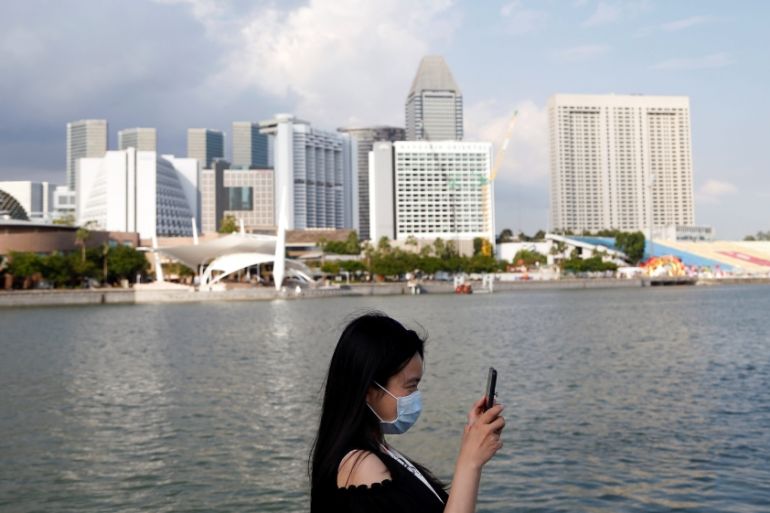Singapore’s economy shrinks, virus-driven recession expected
Singapore’s economy could contract as much as 4 percent in 2020, its trade ministry said.

Singapore‘s economy suffered its biggest contraction in a decade in the first quarter, data showed on Thursday, as the coronavirus pandemic prompted the city-state to cut its full-year gross domestic product (GDP) forecast and plan for a deep recession.
The grim data is likely to reinforce fears that global activity will sharply contract in the first half of the year. Singapore is one of the world’s most open economies and one of the first to report growth data since the virus spread from China at the start of the year.
Keep reading
list of 3 itemsSingapore allocates $4bn to support virus-hit economy
Virus freezes hiring across Singapore, Hong Kong’s finance firms
The economy of the Asian financial and trading hub shrank by 2.2 percent in the first quarter from a year earlier, preliminary readings from the Ministry of Trade and Industry showed.
“The sharp contraction in Singapore’s economy in [the first quarter] was deeper than expected, and with global growth collapsing, the worst is yet to come,” Alex Holmes, Asia economist at Capital Economics said in a note on Thursday.
That marked the biggest drop since the 2009 financial crisis and was below economists’ expectations for a 1.5 percent decline. On a quarterly basis, GDP shrank 10.6 percent, the lowest since 2010 and well below expectations for a 6.3 percent decline.
The data prompted the trade ministry to cut its 2020 GDP forecast range to negative 4 percent to negative 1 percent, from a previous range of negative 0.5 percent to 1.5 percent, and firmed up investors’ bets for a significant fiscal and monetary stimulus.
“The COVID-19 outbreak has escalated and led to a significant deterioration in the economic situation both externally and domestically,” the trade ministry said.
Just weeks after announcing multi-billion dollar schemes to offset the effect of the outbreak on businesses and households in its annual budget, the finance ministry is set to announce more relief packages later on Thursday.
“We think the government is likely to expand on the support it announced in the 2020 budget last month. A strong fiscal position means it has plenty of room to do so,” said Capital Economics’ Holmes.
The Monetary Authority of Singapore (MAS), meanwhile, has brought forward its semi-annual monetary policy statement to Monday, March 30 and many economists are expecting drastic easing not seen since the financial crisis.
“The extent of the first two months already tells you … how bad it is going to get,” Selena Ling, head of treasury research and strategy at OCBC Bank, told Reuters.
“The likelihood is that they will bring out a very big bazooka this afternoon and come next Monday, MAS will also do what’s necessary.”
Singapore has been battling the virus outbreak which has killed more than 19,000 globally since mid-January. It has seen a surge in mainly-imported infections in recent days and on Wednesday recorded its biggest daily jump in cases, bringing its total to 631.
“With a number of major industrial economies now instituting social distancing measures and/or lockdowns, large-scale near-term declines in economic activity are on the way and a global recession is now our baseline,” Oxford Economics said in a note to clients this week, while noting growth could rebound quickly once tough containment measures are lifted.